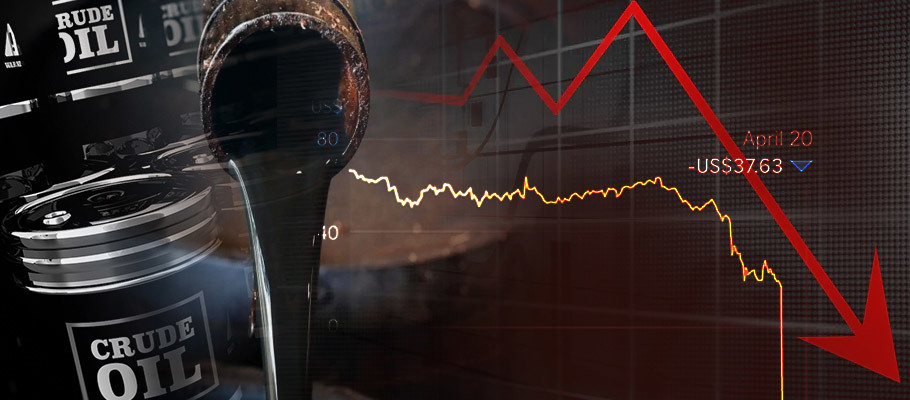
Published: April 23th, 2020
An unprecedented plunge in crude oil prices knocked global equity markets lower and pushed bond prices up as investors continued the search for safe havens amid the current – and coming – economic impact of the COVID-19 pandemic.
As global crude storage reached capacity around the world, the front-month benchmark US crude benchmark contract fell by more than 300 per cent, scraping -$37.90 per barrel. It’s the first time oil futures have ever traded in negative territory.
With contracts set to expire at the end of trade on Tuesday, investors rushed to get them off their books at any price. Later in the week, contracts bounced back into positive figures, but the historic plunge continued to shock investors and pushed down Asian currencies at the start of the week.
Asian currencies remained tepid on Thursday on expectations of dire US and Eurozone PMI data for manufacturing and services due to be released this week, laying bare the true scale of economic carnage caused by the coronavirus pandemic.
The Indonesian rupiah fell on Wednesday and Thursday as the country’s central bank made its first direct government bond purchase to limit the recent rise in yields from a surge in selling by foreign investors.
The crash in oil prices followed weeks of lockdown measures that have brought economic activity and energy consumption to a standstill. OPEC and partners states were slow to agree reduced production targets in response, leading to a glut of oil that squeezed storage facilities and cratered crude oil prices.
The collapse in crude oil futures shined another spotlight on the intense disruptions being experienced around the world and dampens expectations for a fast return to normal.
Forex broker CMC Markets said the crude shock pointed to ‘clear evidence of demand destruction,’ with relevance beyond energy markets. In a note published this week, the firm said evidence of economic damage is mounting, and that it's increasingly unlikely that national economies will able to simply 'switch everything back on' once the pandemic subsides.
While the economic signals are worrying enough, crude’s price plunge also puts new and unwelcome pressure on oil producers, with investors concerned that a credit crunch might do lasting damage to heavily indebted energy firms, even cause their collapse.
The history disruption to oil markets arrived just as hopes for a fast recovery from the COVID-19 crisis began to wane. Western governments have followed a cautious path, and many show no signs of readiness to unlock restrictions on travel, personal movement, or non-essential retail.
Analysts at Oxford Economics said China’s experience has shown that industrial production can return to normal relatively quickly after lockdown measures are eased. Still, consumer spending will need more time to revive, especially if social distancing and other restrictions on movements are sustained.
The greenback continued to be seen as a safe-haven against other majors such as the Australian and New Zealand dollars. News of renewed stimulus from the US government on Wednesday also served to shore up its value.
The dollar pushed past currencies of oil producers late in the week as crude prices began to slowly rebound.
Analysts said sentiment remained broadly supportive of the dollar because of a phoenix-like character that keeps its value coming back. If the COVOID-19 pandemic does drive a global depression as some expect, it will prompt investors to look for even more safety, and shift more of their funds over to dollars.
The euro also held steady against both the dollar and the pound ahead of an EU meeting to assess the bloc’s response to economic turmoil caused by the pandemic.
Some 2.4 million people have been infected by COIVID-19 globally with the death toll exceeding 184,353 as of this writing, according to Reuters.
Protests against lockdowns have begun to take place in the US – the worst-hit nation globally – as debate intensifies over the length of the lockdown period and timings for recovery.
A sudden spike in new infections following Japan’s too-early easing of restrictions has US health experts fearing that the US could face a similar and even deadlier second wave of infections if the lockdowns end prematurely.
Even after weeks of bad news and worrying economic indicators, some analysts believe investors are still underestimating the likely impact of economic lockdown on earnings results.
Analysts at Credit Suisse Securities told journalists this week that markets are seeing scales of declining economic activity that have never been recorded before. ‘The potential impact on GDP in Q2 could far exceed what we saw at the worst point of the financial crisis’ the company’s economics unit said in a note.
Asian stock markets began to rise late in the week alongside rebounding crude prices and the announcement of more government stimulus to cushion the COVID-19-ravaged US economy.
More upbeat corporate earnings in America posted mid-week also gave equity prices a boost, though analysts reiterated that overall sentiment remained fragile.
They also pointed out that the recent recovery in stock prices has mainly been led by the big tech firms, an effect not seen across all sectors.
Four-fifths of US stocks remain in bear market territory, along with the US small-cap, and European benchmark equity indices. That places doubt on any impression that investors sustain any sort of optimistic outlook.